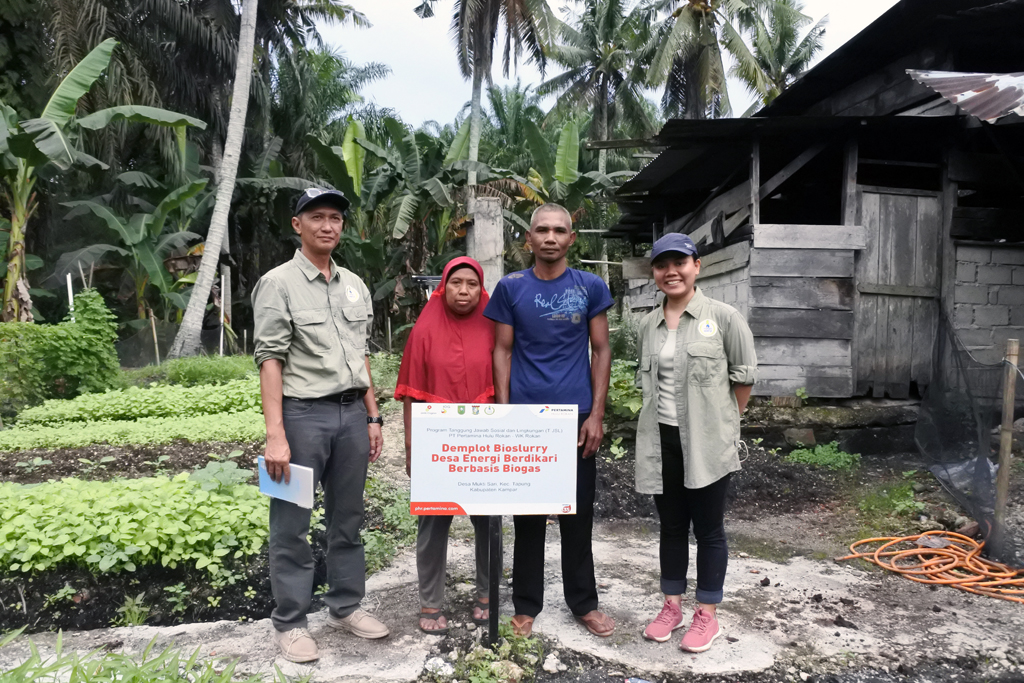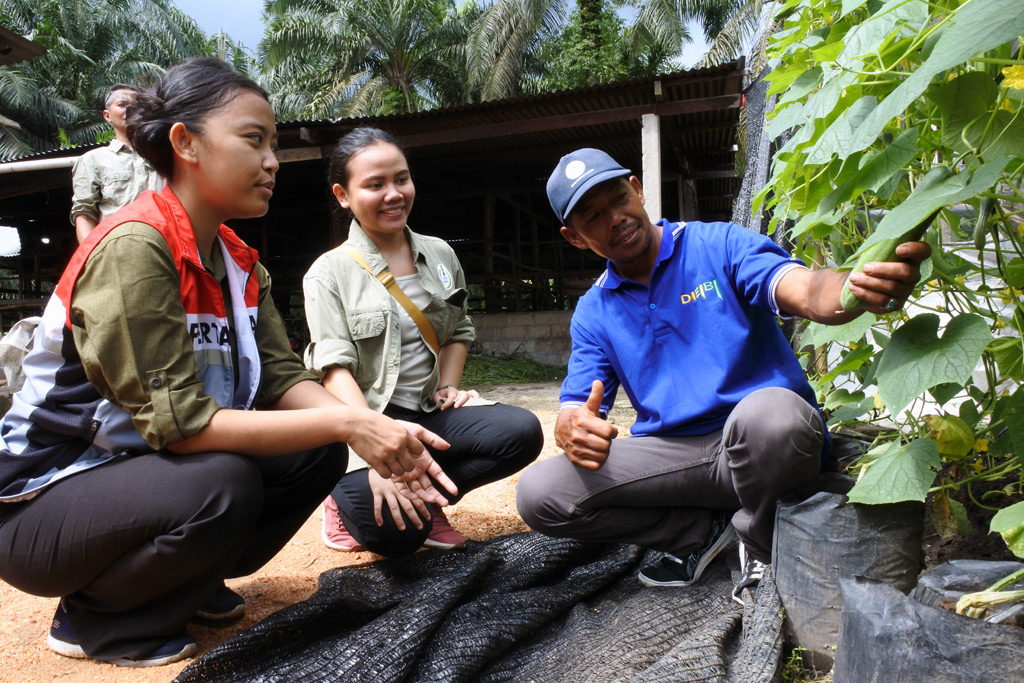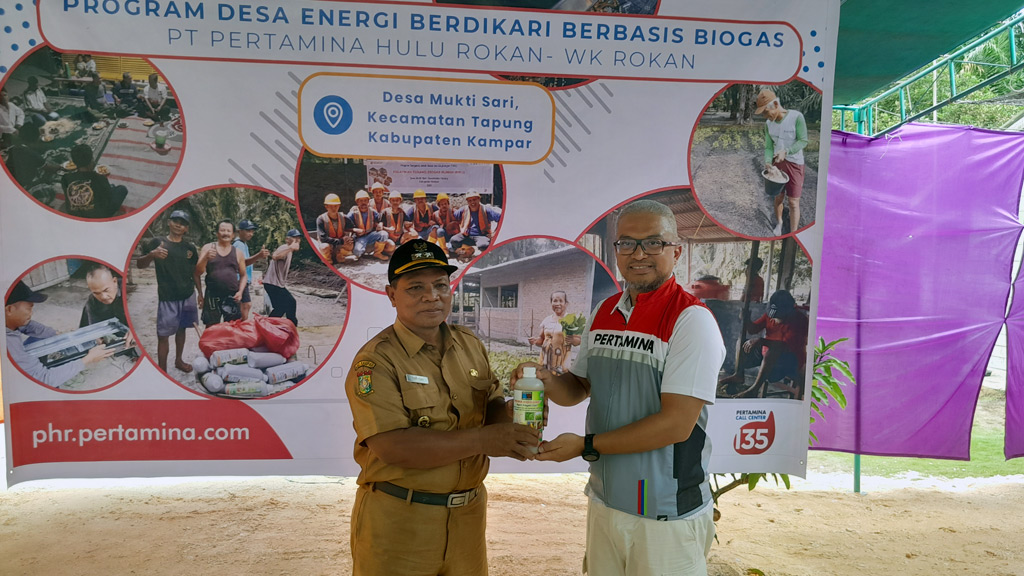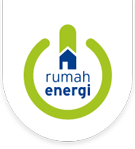Muktisari Village's Journey to Independent Energy

To support the energy transition and empowerment of community groups in its operational areas, PT Pertamina Hulu Rokan – WK Rokan (PT PHR) is collaborating with the Rumah Energi Foundation (YRE) in implementing the Social and Environmental Responsibility Program (TJSL) in Kampar Regency and Pekanbaru City. “Biogas-Based Independent Energy Village” often called the DEB Program aims to improve community welfare through renewable energy technology, namely biogas. PT PHR with YRE are working together to increase community capacity in developing the biogas market through outreach and education, using biogas as an alternative technology for cooking, strengthening communities, and developing biogas derivative products in the form of bio-slurry for sustainable agriculture and circular economy practices.
The DEB program implemented through a partnership between PT PHR and YRE in 2022 and 2023 has provided benefits to 143 people in Kampar Regency and Rumbai District from a total of 21 biogas units built and spread across Muktisari Village, Tapung District (20 units) and in Palas Village, Tapung District (1 unit). The diversity of types of waste used to make biogas in Muktisari Village is a symbol of a community that has successfully transitioned to an independent cooking energy source through the use of cattle, goat, tofu dregs waste, and even human waste by Islamic boarding schools. Apart from building biogas, biogas technical training is also carried out for local workers and education on the operation and maintenance of biogas, as well as the introduction of bio-slurry derivative products from biogas through a series of training to build a biogas ecosystem at the site level.
Economic independence is also one of the goals to be achieved by the DEB Program. Households that switch to biogas can save spending on LPG of up to IDR 75,000 per month. These savings costs are usually used for savings or other daily needs. Apart from that, after technical training and biogas construction for 11 people, then 3 of them took part in the construction work of 2 biogas units in Tapung District outside the DEB Program. This an initial success in developing a local biogas ecosystem in Kampar Regency.

As a strategy for sustaining the DEB Program independently by the local community, the impact of intensive assistance within 4 months resulted in a community group of biogas users named “Biotama Agung Lestari”. The origin of Biotama comes from the words Biogas, Pertamina, and Masyarakat. Meanwhile, Agung here means big/magnificent, and Lestari means sustainable. Biotama Agung Lestari, which is part of the Bhina Muktisari Group, is supported by the Muktisari Village Head and the Kampar Regency Plantation, Livestock and Animal Health Service was formed as a forum for the group to exchange ideas and optimize the development of bio-slurry derivative products. 2,200 liters of liquid organic fertilizer products successfully produced by the Group and 193 of 1 liter bottles sold in 2 months. Through the development activities of the Biotama Agung Lestari Group, the economy of its members’ families is also expected to increase due to the diversification of monthly income sources.
A sense of cooperation among beneficiary groups also created through the DEB Program. Some beneficiaries who do not have enough daily waste to process into biogas receive cow manure from neighbors or relatives for free. Apart from that, 2 biogas beneficiary families also distributed biogas to their neighbors’ houses because of the excess daily biogas production for cooking needs in their homes. The responsibility of every party who benefits from biogas, directly or indirectly, is stimulated to be carried out in a balanced and fair manner. This is good practice in building a community.
The good impact of using biogas is not only in economic, social, and community aspects but also includes health and the environment. The 21 biogas installation units have the potential to manage 319.4 tons of waste a year, thereby reducing emissions by up to 52.5 tCO2e per year. By managing waste for biogas, the cleanliness of the cage area, the house and kitchen will be better. Some beneficiaries who previously used firewood for cooking are no longer expose to smoke which can cause respiratory problems because they have switched to cleaner cooking technology. Apart from that, the amount of heat energy produced by the built unit can reach 105,402 kWh per year.

The development of renewable energy at the site level is important to establish and strengthen independence in meeting current and future energy needs. The circular economy approach in developing the DEB Program is a leverage point that supports the sustainability of the program by its beneficiaries. Apart from adopting similar programs in other areas, there are still many potential that can be developed at the community level to strengthen villages that are self-sufficient in energy sources. Widespread and sustainable amplification of the program’s impact is expected to be realized through synergy and collaboration with existing local government programs and can be adopted by various other stakeholders.
Written by: Danastri Widoningtyas

